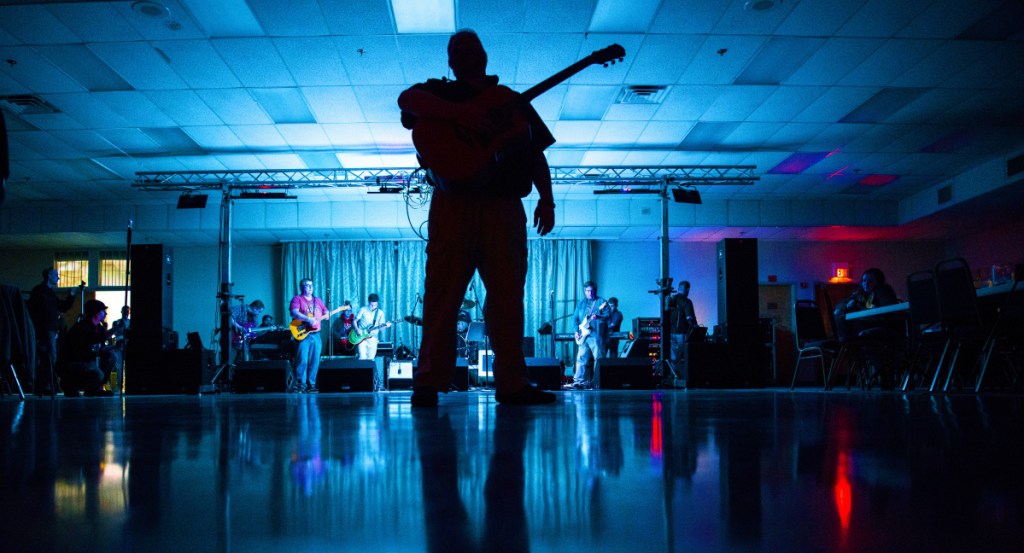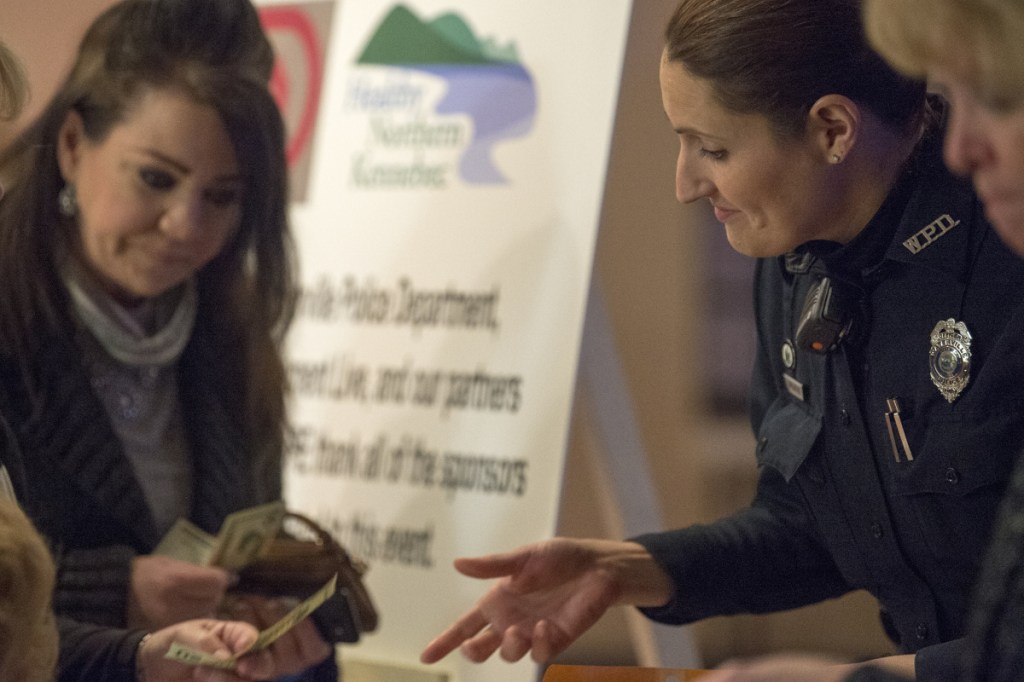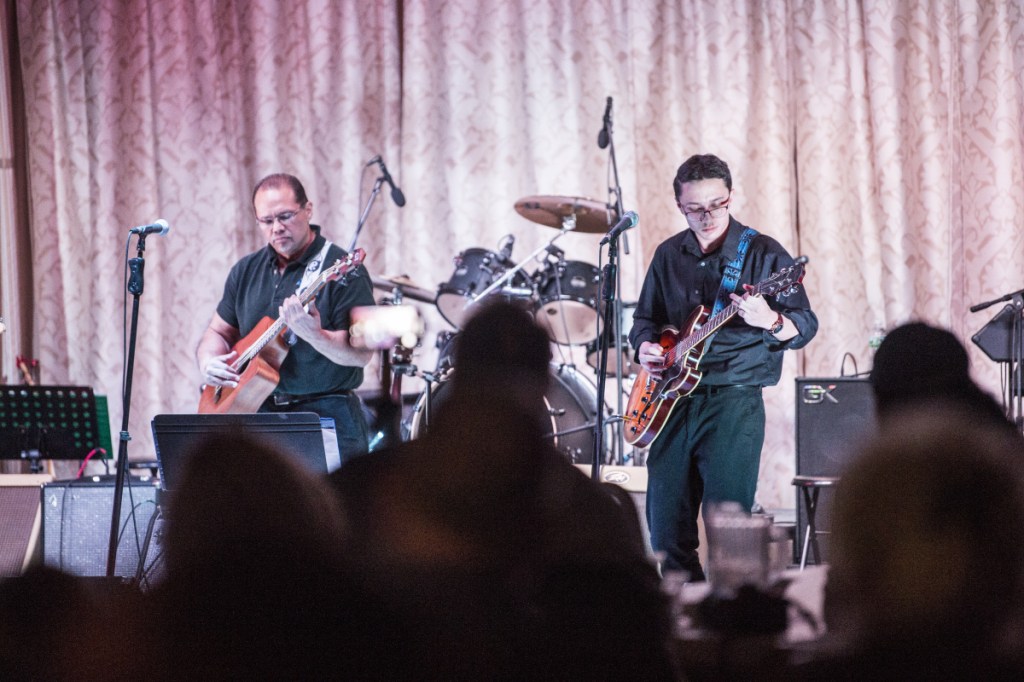WATERVILLE — Despite plunging temperatures and icy roads, and going up against the Patriots’ throttling of the Tennessee Titans, nearly 200 people gathered at the Elks Lodge for the second annual Operation HOPE benefit concert Saturday night to raise funds for city residents suffering from addiction.
The city’s Operation HOPE, which stands for Heroin Opiate Prevention Effort, is a police-led effort that focuses on enforcement, education and treatment, with the primary focus on treatment of people suffering from substance abuse disorder.
Launched in January 2017, the program sent 37 people to a treatment or healthy living facility over the course of the past year.
According to Deputy Police Chief Bill Bonney, the program’s first year was a big success, between the first benefit concert and private donations.
No taxpayer money is spent on the program, other than police salaries.
The first benefit concert last January raised about $3,000. he said.
“The opiate epidemic is a community problem, so to me it’s nice to see the community step up and help the Police Department to solve the problem,” Bonney said.
Last year, they ran out of all 100 tickets they had for sale. On Saturday night, they sold about 165 tickets.
‘BLESSED TO HELP OUR COMMUNITY’
“Obviously each year when you do something like this you want to make more than the year before, but you want to make sure everyone has a good time so we can continue,” Bonney said.
Eric Lunt – who owns Big Entertainment Live, which put on the show – said every musician who took the stage Saturday night was a friend of his, volunteering their time and talents.
The performers were not in a specific band, but rather cycled through, and ranged in age from 10 to 60.
After an opening act ran through an original song titled “I Got the Blues This Morning,” – a song the performers had never played as a full band before – Lunt took the floor, singing an a cappella version of the Beatles’ “Blackbird,” before the full band jumped into a version of “Sweet Inspiration.”
“We’re extremely blessed to help our community and use our gifts we’ve been given,” Lunt said before going on stage.
Operation HOPE was modeled after the ANGEL program in Gloucester, Massachusetts, and the Scarborough Police Department’s Operation HOPE. The Waterville program partners with the Police Assisted Addiction Recovery Initiative to help those addicted to opiates get into rehabilitation facilities around the country.
Waterville police work with officials from the Kennebec Valley Community Action Program, Discovery House of Central Maine, MaineGeneral Medical Center and Healthy Northern Kennebec.
CITED BY COLLINS
U.S. Sen. Susan Collins, Maine’s Republican senior senator, recently spoke about the program during a Senate Health Committee hearing on the opioid crisis.
At the hearing, author and former Los Angeles Times journalist Sam Quinones, whose 2016 book “Dreamland” covered the national epidemic, was questioned by senators on how the epidemic spread and how the United States should deal with the crisis.
In addition to recognizing the “Lost” series published by the Portland Press Herald/Maine Sunday Telegram – a 10-part series on the state’s opioid addiction crisis – Quinones was questioned by Collins about Operation HOPE.
Specifically, Collins mentioned a Morning Sentinel article about Verna Buker, a mother who believes that Waterville’s HOPE saved the life of her daughter, who at 27 had been involved with opiates for years and had overdosed twice.
“One possible community-based approach was described in the Morning Sentinel,” Collins said, “and it struck a chord with me because law enforcement officials in my state tell me that their jail intake rooms resemble hospital emergency rooms. (Operation HOPE) is a whole different approach for law enforcement to take. … It allows them to get the help that they need.”
Collins asked Quinones: “In your experience, have you seen that type of program work better than the traditional approach?”
Quinones praised the efforts of law enforcement officers across the country, highlighting the importance of new, innovative approaches being taken to adapt and respond to the drug crisis.
“With regards to law enforcement, in general, some of the most innovative folks and things I’ve seen come from law enforcement,” Quinones said.
“You’d think law enforcement would be holding on to the old ways of locking people up. I’ve been amazed to see the remarkably innovative ideas that come out of law enforcement. The one you mentioned is one of them.”
TALKING UP THE PROGRAM
In addition to the HOPE benefit concert, Bonney said he and Police Chief Joseph Massey regularly go around the city and speak about the program to other organizations.
He said it’s important to keep getting the word out to the public so they can reach more people suffering from substance abuse.
“Coming to the Police Department is counterintuitive for someone with substance abuse disorder,” Bonney said.
“The goal is not to just let the community know we’re doing this, but to let those suffering from substance abuse disease know that they can come here and it’s a non-threatening environment. We have seen in recent months what I would consider an uptick. Not everybody that calls follows through, but we do get a lot of calls.”
Send questions/comments to the editors.





